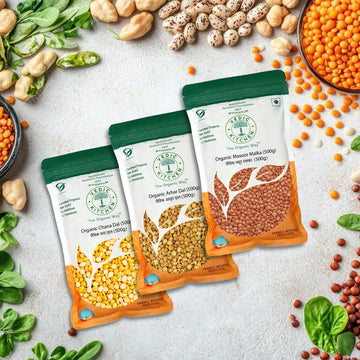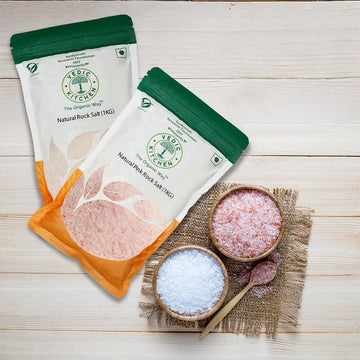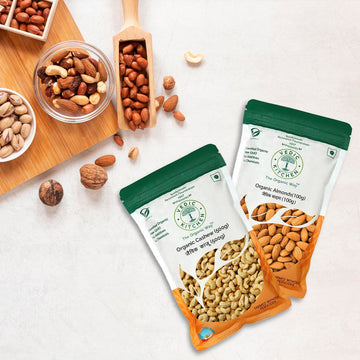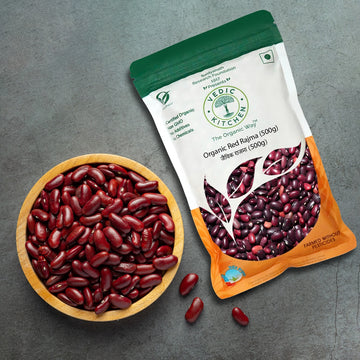
Selecting the best organic dals (lentils) for your family—looking at the aisles flooded with so much variety, one might think this is a very cumbersome task. Therefore, zeroing in on a few relevant factors can help make things easier while really making sure that you are making a healthy and eco-friendly choice. Here is a comprehensive guide to help you get the best bet on organic dals for your family.
Understanding Organic Dals
Organic dals are lentils reared or grown without synthetic pesticides, herbicides, and genetically modified organisms. They are reared or cultivated in accordance with organic farming practices that respect the environment and consumer health. Very often, when you go for organic dals, you are actually supporting environment-friendly farming practices and consuming produce with reduced chemical residues.
Benefits of Organic Dals
- Health Benefits: Organic dals have less of a chance to contain hazardous chemicals and pesticides. They are a rich source of protein, fibre, and vitamins and minerals—very healthy to add on to any diet.
- Ecological Impact: Practices in organic farming are oriented toward the preservation of soil fertility, reduction of pollution, and preservation of biodiversity.
-
Taste and Quality: Most people find organic dals to taste and look better than inorganic ones. In the absence of synthetic additives, the flavours could seem more natural.
Factors to Consider When Choosing Organic Dals
- Check for Certification: The dals you choose must be certified organic from a reputed certifying body in India and carry the India Organic or Jaivik Bharat logo.
- Examine the Source: Their origin is another factor that may have a bearing on the quality of the dals. Organic dals are grown in different parts of the country, and the soil and climatic conditions of the growing area could give them a distinct taste and high nutritional value.
- Look for Whole Dals: Use whole dals as opposed to split or processed ones. Whole dals contain more natural nutrients and flavor in the beans.
- Check Freshness: Freshness is needed for getting the right taste and nutrition. Organic dals need to have a fresh, good smell and not be damp or moldy.
Check the Variety
Multiple varieties of dals yield multiple flavours and nutritional benefits. Some popular varieties are :
Toor Dal: This dal is high in protein and fibre content, hence extensively used in Indian cuisine.
Masoor Dal: Quick-cooking and easily digestible, masoor dal is full of iron and folate.
Chana Dal: A slightly sweet flavour comes with high protein content, thus ideal for preparing soups and stews.
Moong Dal, Green Gram: This dal is rather mild in taste, almost nutty, light on the belly, and full of vitamins and minerals.
Read Reviews and Labels
Go through customer reviews before purchasing the product. Moreover, get through the labels to find any sort of information on the dal regarding its being GMO-free or else the add-ons added into it.
Local vs. Imported
While many imported organic dals can be good, a whole lot of local options support smaller and more local farms and will often have fresher products. Try buying from a local source if they meet your quality threshold.
How to Store Organic Dals
Proper storage helps to preserve freshness and quality in dals. Keep dals in an airtight container at room temperature in a dry location and out of direct sunlight. If stored correctly, they can be stored over a period of between six and eight, sometimes 12 months. Always check for any signs of spoilage, such as unusual odours or discoloration, before use.
Cooking Tips for Organic Dals
- Rinsing: Rinse the organic dals properly every time before use to remove dust and impurities.
- Soaking: Soaking dals before cooking reduces cooking time, and they become easily digestible. Some dals, however, may not need soaking—like moong dal.
- Cooking Methods: Organic dals can be used as soups, stews, daals. You can try out different recipes to see how best you can use them.
Choosing the best organic dals for one's family will require examination of certification, source, freshness, and variety. With such details in mind, one will ensure that they have chosen high-quality and highly nourishing dals, which serve one's family's dietary needs and values. Reap all the benefits organic produce has in store for you, along with the rich flavors and health advantages associated with choosing the best organic dals for your family.




